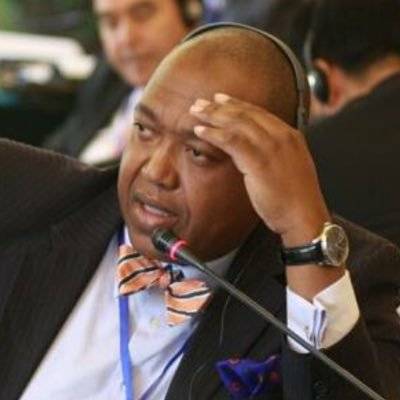Sudanese president Omar Al-Bashir visited Qatar on Wednesday. His visit comes during the most tumultuous time of his presidency back in his home country, in which Al-Bashir and his government have been facing sustained protests calling for his resignation.
Al-Bashir has since asked a number of countries for assistance, including Turkey, Russia and the United Arab Emirates (UAE). According to Al Jazeera, “the protests started over the rising costs of bread and fuel, but have since widened to call for the overthrow of long-time President Omar al-Bashir”.
Al-Bashir came to power after he toppled the government of Sadiq Al-Mahdi in 1989. His government has been accused of using excessive force in dealing with protests, with scores of injuries and deaths reported since the protests commenced. During one of Al-Bashir’s first public addresses since the protests began, he told crowds that “we admit that we have economic problems but they can’t be solved by destruction, lootings, and thefts”. However, many Sudanese people doubt whether Al-Bashir will address these challenges, particularly given the manner in which the security forces have dealt with the protestors.
The people have accused the government of “calling for calm and promising redress [while] they have clamped down on protests, killing and injuring many in the interim”. Al-Bashir has blamed the deteriorating political economic conditions on outside interventions, including economic sanctions. He has blamed everyone but himself for the current problems in Sudan. He is totally oblivious to his complicity in the national socioeconomic and political challenges facing country.
Read: Egypt, South Sudan discuss Sudan’s protests, Bashir’s future
While the trigger for the protests might have been economic conditions, there have been simmering political concerns in Sudan for years. Among them is Al-Bashir himself who, during his tenure as the president, has overseen rampant levels of corruption, the suppression of basic freedoms and heavy handedness in dealing with political dissent and other forms of civil dissatisfaction. These misjudgments have contributed to the current situation – the Sudanese people are simply “fed up”.
Qatar inadvertently entered the picture this week by hosting Al-Bashir in Qatari capital Doha. According to Qatar News Agency (QNA), “[Emir of Qatar Tamim Bin Hamad Al-Thani] will meet at the Amir Diwan on Wednesday with HE President of the Republic of the Sudan, who will arrive in Doha on Tuesday. HH the Amir [Al-Thani] and the Sudanese President will discuss the fraternal relations between the two countries and ways of promoting them”.
Al-Bashir’s visit came during a very busy week for Qatar. The country was also facilitating a meeting in Doha between the Taliban and Zalmay Khalizad, the US special representative on Afghanistan reconciliation. President of Pakistan, Imran Khan, was also in Qatar, where he later addressed thousands of Pakistani expats in a separate meeting in Doha. It was certainly a week full of political boons for Qatar – while some of its neighbors are fighting bad publicity, Qatar on the other hand seems to be riding on a high wave.
Read: Sudan opposition: Protests to continue until Bashir steps down
However, there is a twist to Qatar’s week of public relations boons. Many in Sudan may have misinterpreted the visit of Al-Bashir, particularly at this point in their political history. There are already rumors gaining momentum that perhaps “he went to negotiate some sort of asylum in Qatar”. Qatar has, over the years, been very active in assisting Sudan in solving its internal political impasses, a case in point being its ongoing efforts to achieve peace and stability in the western region of Darfur.
The other rumor is that Al-Bashir went to Qatar “to seek help”, though what sort of help remains speculative. This is where things could turn against Qatar. The people of Sudan might view anyone seen to be assisting Al-Bashir, in any form, negatively. Qatar needs to move fast in communicating its relationship and indeed engagements with Al-Bashir at this stage – these speculations cannot be left to open interpretations. The politics of Sudan will never be the same after these protests, therefore clarifying its engagement with Al-Bashir is key, as Qatar will form part of important building blocks to future political realities in Sudan.
Whatever the reasons for Al-Bashir’s visit to Qatar, it can be concluded that the protests will continue. Civil society has been emboldened and the protests have also given birth to a strong global movement among the Sudanese diaspora. This means the voices calling for Al-Bashir’s removal from power and being place under sanctions abroad will intensify. The heavy handedness with which the security forces have dealt with protestors has also strengthened protesters resolve – they are aware of the likelihood of government retribution if their demands fail. This is something Qatar might seriously consider moving forward, for the end is nigh and perhaps a discussion about an alternative must ensue.
Read: Protests rage on across Sudan as doctor and child are killed in violence
The views expressed in this article belong to the author and do not necessarily reflect the editorial policy of Middle East Monitor.

![Sudan's ousted President Omar Al-Bashir at the Khartoum International Airport on 25 October 2018 [Ashraf Shazly/AFP/Getty Images]](https://i0.wp.com/www.middleeastmonitor.com/wp-content/uploads/2018/12/2018_10-25-Sudans-President-Omar-al-BashirGettyImages-1053262930.jpg?fit=920%2C613&ssl=1)







